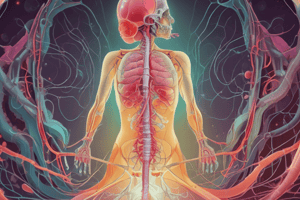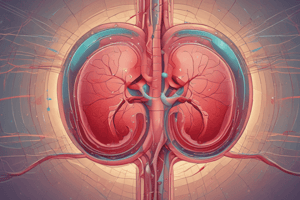Podcast
Questions and Answers
Which organ is responsible for monitoring and regulating the functioning of the kidneys?
Which organ is responsible for monitoring and regulating the functioning of the kidneys?
- JGA (correct)
- Heart
- Hypothalamus
- Adrenal cortex
What activates the osmoreceptors in the body?
What activates the osmoreceptors in the body?
- Changes in blood oxygen levels
- Changes in body temperature
- Changes in blood volume (correct)
- Changes in blood sugar levels
What hormone is released by the hypothalamus in response to excessive loss of fluid from the body?
What hormone is released by the hypothalamus in response to excessive loss of fluid from the body?
- Angiotensin II
- Antidiuretic hormone (ADH) (correct)
- Atrial Natriuretic Factor (ANF)
- Aldosterone
What is the function of ADH in the kidneys?
What is the function of ADH in the kidneys?
What effect does an increase in body fluid volume have on the release of ADH?
What effect does an increase in body fluid volume have on the release of ADH?
What role does the JGA play in the regulation of kidney function?
What role does the JGA play in the regulation of kidney function?
What does the release of renin by the JG cells result in?
What does the release of renin by the JG cells result in?
What is the effect of angiotensin II on blood vessels?
What is the effect of angiotensin II on blood vessels?
What does aldosterone cause in the kidneys?
What does aldosterone cause in the kidneys?
What does an increase in blood flow to the atria of the heart cause?
What does an increase in blood flow to the atria of the heart cause?
Flashcards are hidden until you start studying
Study Notes
Kidney Regulation
- The hypothalamus monitors and regulates the functioning of the kidneys.
Osmoreceptors
- Osmoreceptors are activated by changes in blood osmolality, particularly an increase in solute concentration.
Antidiuretic Hormone (ADH)
- ADH is released by the hypothalamus in response to excessive loss of fluid from the body.
- The function of ADH in the kidneys is to increase water reabsorption in the collecting ducts, resulting in concentrated urine.
Regulation of Kidney Function
- An increase in body fluid volume inhibits the release of ADH.
- The juxtaglomerular apparatus (JGA) plays a crucial role in the regulation of kidney function by monitoring blood pressure and electrolyte balance.
- The release of renin by the JG cells results in the activation of the renin-angiotensin-aldosterone system.
Renin-Angiotensin-Aldosterone System
- Angiotensin II causes vasoconstriction of blood vessels, increasing blood pressure.
- Aldosterone causes the kidneys to increase sodium reabsorption and potassium excretion.
Blood Flow Regulation
- An increase in blood flow to the atria of the heart stimulates the release of atrial natriuretic peptide (ANP), which inhibits the release of ADH and aldosterone, promoting sodium excretion and increasing urinary output.
Studying That Suits You
Use AI to generate personalized quizzes and flashcards to suit your learning preferences.




